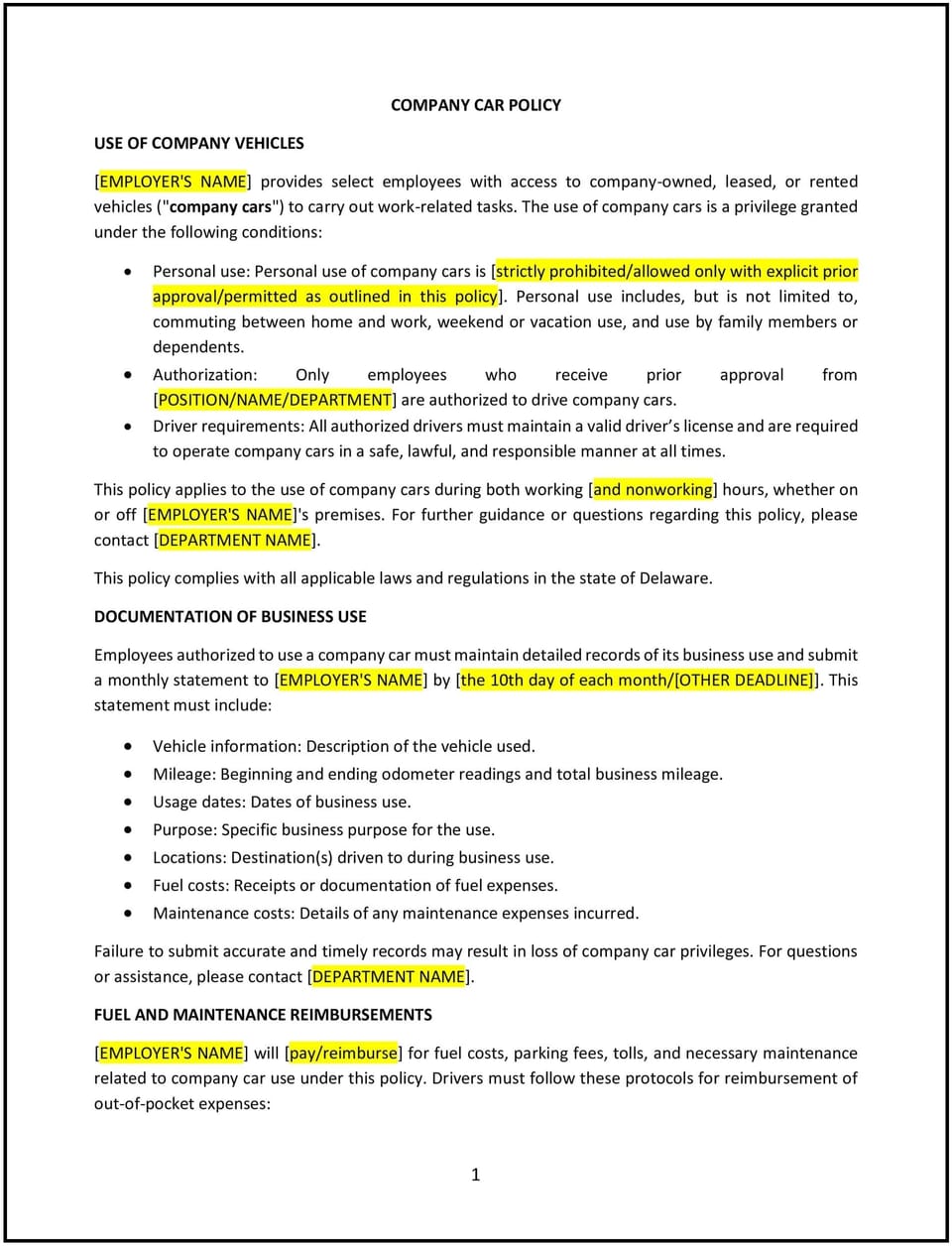Company car policy (Delaware): Free template

Company car policy (Delaware)
A company car policy helps Delaware businesses establish guidelines for the use of company-owned or leased vehicles. This policy outlines eligibility, usage rules, maintenance responsibilities, and procedures for reporting accidents or issues to ensure safe and appropriate use of company vehicles.
By implementing this policy, businesses can manage vehicle usage effectively, promote driver safety, and ensure compliance with Delaware laws and company standards.
How to use this company car policy (Delaware)
- Define eligibility: Specify which employees are eligible for company car use based on their roles or responsibilities.
- Establish usage guidelines: Clarify permitted uses of company cars, including work-related travel and any limitations on personal use.
- Address maintenance responsibilities: Outline requirements for vehicle upkeep, such as routine maintenance, cleanliness, and reporting any mechanical issues.
- Provide safety expectations: Include rules for safe driving, such as seatbelt use, adherence to traffic laws, and a prohibition on driving under the influence.
- Set accident reporting procedures: Explain how employees should report accidents, including required documentation and timelines.
- Include termination procedures: Detail the steps for returning the company car if the employee leaves the organization or changes roles.
Benefits of using this company car policy (Delaware)
This policy offers several benefits for Delaware businesses:
- Promotes driver safety: Encourages safe driving practices and compliance with traffic laws, reducing accidents and liability.
- Ensures proper vehicle care: Assigns responsibility for routine maintenance and cleanliness, prolonging the life of company vehicles.
- Reduces misuse: Sets clear boundaries for personal and work-related vehicle use, minimizing potential misuse.
- Aligns with legal requirements: Helps businesses comply with Delaware laws governing company vehicle usage and insurance.
- Provides clarity: Offers employees a clear understanding of their responsibilities and the company’s expectations regarding vehicle use.
Tips for using this company car policy (Delaware)
- Communicate the policy effectively: Ensure employees understand the rules and expectations for using company vehicles.
- Provide training: Offer guidance on safe driving practices and the proper use of company vehicles, especially for new employees.
- Monitor compliance: Regularly review vehicle usage records to ensure adherence to the policy.
- Maintain insurance coverage: Ensure all company vehicles are adequately insured and that employees are aware of coverage details.
- Update regularly: Review the policy periodically to reflect changes in Delaware laws, insurance requirements, or company practices.
Q: Why is a company car policy important for my business?
A: A company car policy ensures safe and appropriate use of company vehicles, promotes driver accountability, and helps businesses comply with Delaware laws and insurance requirements.
Q: Who is eligible to use a company car?
A: Eligibility is typically based on an employee’s role or responsibilities, such as those requiring frequent travel for work-related purposes. Specific criteria should be outlined in the policy.
Q: Can employees use company cars for personal purposes?
A: Personal use may be allowed or restricted depending on company policy. The policy should clearly define permitted uses and any limitations.
Q: What are employees’ responsibilities for vehicle maintenance?
A: Employees are typically responsible for routine maintenance, keeping the vehicle clean, and reporting any mechanical issues or damage promptly.
Q: How should employees report accidents involving a company car?
A: Employees should follow the accident reporting procedures outlined in the policy, which may include notifying the company immediately, completing an incident report, and providing necessary documentation, such as a police report.
Q: How often should this policy be reviewed?
A: This policy should be reviewed annually or whenever Delaware laws, insurance regulations, or company practices change to ensure continued compliance and relevance.
This article contains general legal information and does not contain legal advice. Cobrief is not a law firm or a substitute for an attorney or law firm. The law is complex and changes often. For legal advice, please ask a lawyer.


